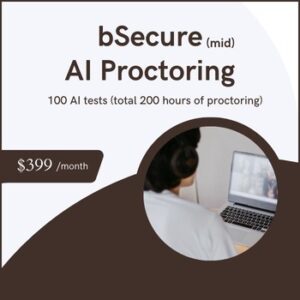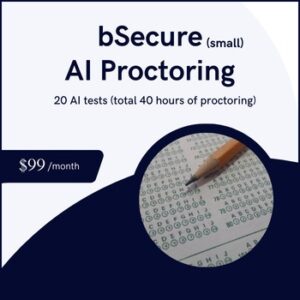Introduction
In the dynamic world of education and professional development, assessment integrity stands
as a cornerstone of academic and ethical excellence. At its core, assessment integrity embodies
the principles of honesty, fairness, and ethical behavior in various forms of evaluation, whether
they occur in classrooms or the workplace. In this blog post, we will embark on a journey to
understand the profound significance of assessment integrity, its impact on individuals and
institutions, the challenges posed by the digital age, and the imperative role it plays in shaping
education and professional ethics.
Defining Assessment Integrity
Assessment integrity encompasses a set of values and principles that safeguard the authenticity
and reliability of evaluations. It ensures that students, professionals, and individuals are
evaluated fairly and justly, without resorting to dishonest means such as cheating or plagiarism.
These principles extend beyond academic institutions, influencing the way professionals are
assessed and promoted in the workforce. By adhering to these principles, assessment
processes become a reflection of personal and professional ethics, fostering a culture of
integrity.
The Impact of Assessment Integrity
The ripple effect of compromised assessment integrity can be felt across every facet of
education and professional growth. When assessment integrity is undermined, the credibility of
degrees and certifications comes into question, rendering hard-earned achievements void of
value. Moreover, it corrodes the educational ecosystem by eroding the principles of meritocracy
and fairness, leading to a system where success is determined by shortcuts rather than genuine
learning. On a broader scale, societies dependent on skilled and ethically responsible
professionals suffer when assessment integrity is not upheld.
Educational Landscape and Assessment Integrity
In the ever-evolving educational landscape, assessment integrity has faced new challenges with
the advent of online learning and remote assessments. The digital age has brought forth both
opportunities and threats: technology can be harnessed to maintain assessment integrity
through anti-cheating software, while simultaneously posing challenges with the potential for
remote impersonation and unauthorized assistance. The importance of adapting assessment
methodologies to this digital era cannot be overstated, as preserving the sanctity of
assessments is crucial to sustaining the credibility of online education.
Cheating and Plagiarism: Common Violations
Two prevalent violations that pose a direct threat to assessment integrity are cheating and
plagiarism. Cheating can take the form of copying answers during exams, using unauthorized
materials, or collaborating without permission. Plagiarism involves presenting someone else’s
work as one’s own without proper attribution. The motivations behind these violations range
from academic pressure to the desire for higher grades. Understanding the psychology behind
these behaviors is essential for addressing them effectively and fostering a culture of integrity.
Digital Age Challenges and Solutions
Technology, often seen as a double-edged sword, offers both challenges and solutions to
assessment integrity. Proctoring software, plagiarism detectors, and secure online testing
environments can mitigate dishonest behaviors during assessments. However, concerns over
privacy and the potential for technology-driven invasions persist. Striking the right balance
between technology and ethical considerations is vital for embracing the digital age while
preserving the sanctity of assessments.
Promoting a Culture of Assessment Integrity
The responsibility of upholding assessment integrity falls not only on educators and
administrators but also on parents and guardians. Educators play a crucial role in designing
assessments that encourage critical thinking and discourage rote memorization. Moreover,
instilling proper citation and referencing practices early on can equip students with essential
skills that prevent unintentional plagiarism. Parents, in turn, can reinforce ethical values at home
and encourage open dialogues about the importance of honest assessments.
Ethics and Assessment Integrity
The connection between assessment integrity and personal ethics is undeniable. Upholding
assessment integrity is not just a requirement; it’s a reflection of an individual’s ethical compass.
When individuals engage in dishonest practices during assessments, they compromise their
personal integrity, potentially leading to long-term consequences for their reputation and
character. The journey towards maintaining assessment integrity is synonymous with embracing
personal responsibility and accountability.
Beyond Education: Assessment Integrity in the Workplace
Assessment integrity isn’t confined to educational settings—it extends to the professional realm.
In workplaces, assessments play a pivotal role in performance evaluations, promotions, and
career advancements. Just as students are expected to adhere to assessment integrity in
academia, professionals must demonstrate integrity in their work-related assessments. A
consistent emphasis on assessment integrity fosters a culture of trust, professionalism, and
ethical conduct, contributing to the growth and sustainability of organizations.
Consequences of Assessment Integrity Violations
The repercussions of assessment integrity violations are far-reaching. Academic penalties,
damaged reputations, legal actions, and the erosion of trust are among the potential outcomes
for those who engage in dishonest practices. Such consequences serve as a sobering reminder
of the importance of maintaining integrity in assessments. These repercussions not only affect
individuals but also cast a shadow over institutions and industries, undermining the collective
pursuit of knowledge and excellence.
Conclusion
In the intricate tapestry of education and professional development, assessment integrity stands
as a beacon of ethical conduct. It underscores the importance of honesty, fairness, and
accountability in evaluations, fostering a culture where learning and growth are rooted in
genuine effort and merit. Whether in classrooms or boardrooms, the significance of assessment
integrity cannot be overstated. It’s a commitment to one’s personal and professional ethics—a
commitment that shapes individuals, institutions, and societies for the better. As we navigate the
complexities of the digital age and evolving educational landscapes, upholding assessment
integrity remains a steadfast principle that guides us towards a brighter, more honest future.









